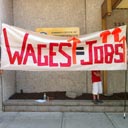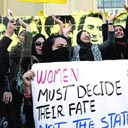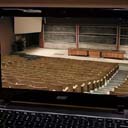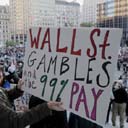
Throughout Mumbai, one can see members of a vast, seldom-remunerated labor pool that does not share in globalization’s promises of plenty and exists on the legal margins. Sixty-two percent of Mumbaikars live on land to which they have no legal claim.

In the last few years, Dresden became the site of an intense political struggle over how to adequately respond to thousands of neo-Nazis marching annually in the streets. It also became the site of an ongoing authoritarian-conservative backlash against social movements.

The CCTV Headquarters constitutes Koolhaas’s attempt to mitigate the pervasive banality he associates with the present. It is probably his masterpiece.

The ex-comedian Beppe Grillo’s Five Star Movement is now the first party in the Italian parliament. His rise, along with the resurgence of Berlusconi, signal a stable right-wing hegemony in Italian politics and society.

In the movement and in their town, Ivone and Vania learned firsthand the pain that comes from silence. They didn’t want to damage a movement that protected other women from this pain by demanding a space in the movement for themselves.

However bold the president’s pitch seems in the current political climate, a minimum wage of $9.00/hour is still a modest threshold by any sensible measure.

Left-wing alliances with fundamentalist groups are betrayals of the majority of their co-religionists, who do not wish to be represented by extremists. Such alliances are also betrayals of basic socialist principle.

A college professor once taught me that a decaying empire clenches onto power with a chokehold. Israel’s occupation of the Palestinian people may not be an empire, but after nearly forty-six years, it has become a sort of reigning paradigm …

For reactionaries of all stripes, complaining about the inefficiency and tyranny of clerks has long served as an excuse to call for both limited government and enhanced executive power.

Two new online exclusives on private initiatives to reform higher education: James Dennis on the CUNY Pathways Initiative and Geoff Shullenberger on the rise of the MOOCs.

A “flexible” corporation requires flexible workers, and as the labor market has shifted, so have the conditions placed on its participants. Flexibility doesn’t just manifest itself in global economic trends. It has now become a central part of the office worker’s performance.

It is cliché now to say that we live in a “risk society.” We simultaneously celebrate “risk-takers” and blame those who undertake “risky speculations” without much pausing over the contradiction.

Many municipal parks agencies have become charity cases, overly dependent upon support from conservancies and “Friends” groups in order to fulfill their missions. Some of the most glaring inequities in the United States are becoming manifest in the way our public spaces are designed, maintained, and regulated.

Walter Cronkite was at the center of a fascinating moment in the history of American mass media, and the television news that he came to embody was fleeting and highly unusual—an attempt to produce serious journalism in a medium associated with escapism.

The ban on medical marijuana in Washington, D.C. has been lifted. But for those caught in the cycle of poverty, addiction, and arrests, the drug war in the District is much the same as it ever was.




















